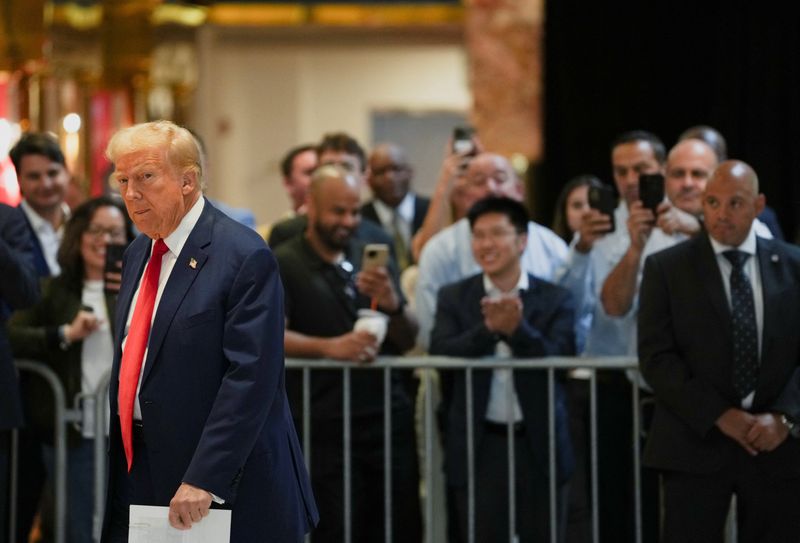Trump to ask New York appeals court to toss nearly $500 million civil fraud judgment
2024.09.26 06:25
By Jack Queen and Luc Cohen
NEW YORK (Reuters) – Donald Trump’s lawyers on Thursday will seek to persuade a New York state appeals court to toss a nearly half-billion dollar judgment against the former U.S. president over real estate business practices a court has declared fraudulent.
Justice Arthur Engoron in February ordered Trump, the Republican nominee for the Nov. 5 election, to pay $454.2 million in penalties and interest for inflating his net worth to induce bankers into giving him better loan terms, in a civil case brought by New York state Attorney General Letitia James.
The judge’s ruling poses a threat to the business empire Trump has built over decades, which includes hotels, office buildings and golf courses around the world. With interest continuing to accrue, Trump now owes $478.3 million.
The case is one of a number of legal entanglements Trump has faced since leaving the White House in 2021. He owes nearly $90 million in federal civil penalties for defaming a writer who accused him of sexual abuse, and was convicted in May on criminal charges stemming from hush money paid to a porn star.
Trump has denied all wrongdoing and argues the cases were brought to interfere with his campaign. A Reuters/Ipsos poll on Tuesday showed Vice President Kamala Harris, the Democratic nominee, leading Trump 47%-40% nationwide, though the state-by-state results of the Electoral College determine the winner.
In a brief submitted in July to the Appellate Division – the mid-level state appeals court – Trump’s lawyers argued that the financial statements he submitted to banks actually understated his wealth, and there was no indication that any of the lenders suffered losses.
The lawyers also accused James, a Democrat, of targeting a political adversary.
“This politically motivated prosecution attempts to penalize purely proper and lawful conduct,” Trump’s lawyers wrote.
In a response in August, lawyers with James’ office said that the statute under which they sued Trump does not require proof that the banks lost money or relied on Trump’s misleading statements in deciding to lend to him.
The purpose of the law, the state lawyers argued, was to “protect the honesty and integrity of commercial marketplaces in New York” by stopping fraud before it causes losses.
The case stemmed from Trump’s leadership of his family real estate company, the Trump Organization, before he became president in 2017.
In September 2023, before a three-month trial with no jury, Engoron found Trump liable for lying about his asset values and net worth for a decade. He took particular issue with Trump’s claim that his Manhattan penthouse apartment was 30,000 square feet (2,787 square meters), nearly three times its real size.

The trial focused solely on penalties. In addition to the financial penalties, Engoron banned Trump from serving in a top role at any New York company, or seeking loans from banks registered in the state.
Trump in April averted possible asset seizures by posting a $175 million bond while he appeals.








